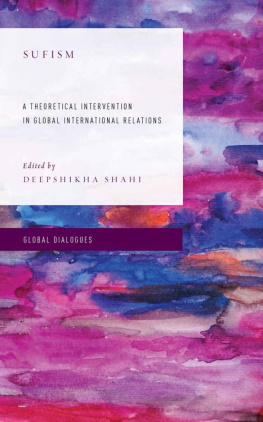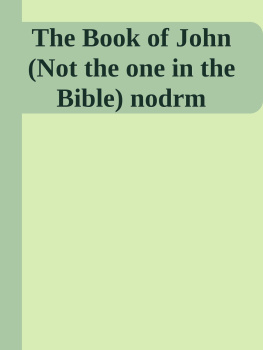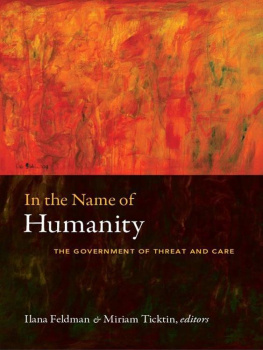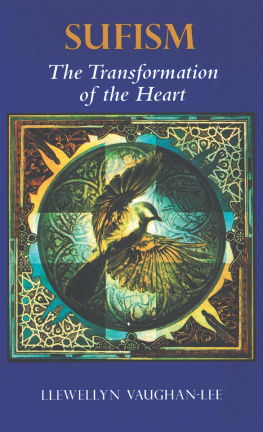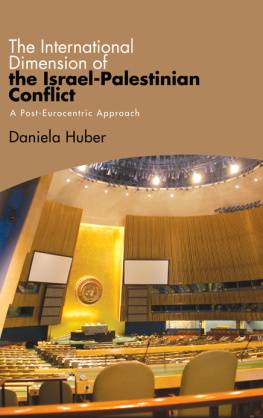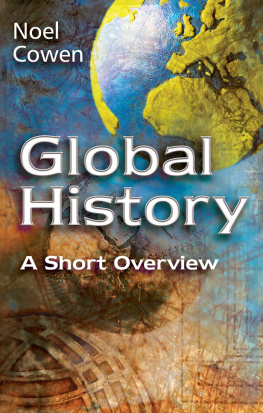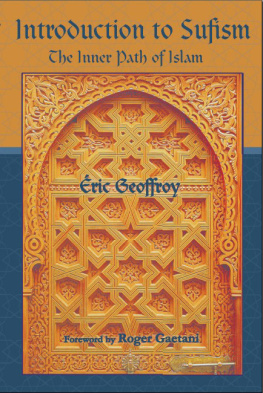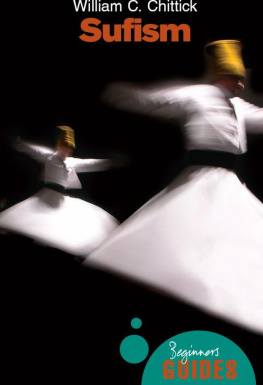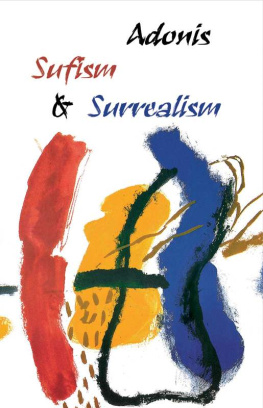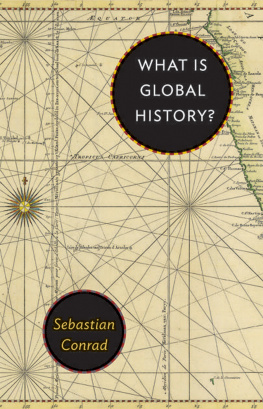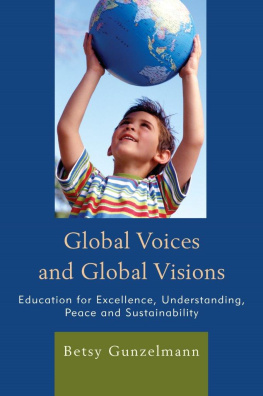Unknown - Sufism (Global Dialogues: Non Eurocentric Visions of the Global)
Here you can read online Unknown - Sufism (Global Dialogues: Non Eurocentric Visions of the Global) full text of the book (entire story) in english for free. Download pdf and epub, get meaning, cover and reviews about this ebook. year: 2020, publisher: Rowman & Littlefield Publishers, genre: Politics. Description of the work, (preface) as well as reviews are available. Best literature library LitArk.com created for fans of good reading and offers a wide selection of genres:
Romance novel
Science fiction
Adventure
Detective
Science
History
Home and family
Prose
Art
Politics
Computer
Non-fiction
Religion
Business
Children
Humor
Choose a favorite category and find really read worthwhile books. Enjoy immersion in the world of imagination, feel the emotions of the characters or learn something new for yourself, make an fascinating discovery.
Sufism (Global Dialogues: Non Eurocentric Visions of the Global): summary, description and annotation
We offer to read an annotation, description, summary or preface (depends on what the author of the book "Sufism (Global Dialogues: Non Eurocentric Visions of the Global)" wrote himself). If you haven't found the necessary information about the book — write in the comments, we will try to find it.
Unknown: author's other books
Who wrote Sufism (Global Dialogues: Non Eurocentric Visions of the Global)? Find out the surname, the name of the author of the book and a list of all author's works by series.
Sufism (Global Dialogues: Non Eurocentric Visions of the Global) — read online for free the complete book (whole text) full work
Below is the text of the book, divided by pages. System saving the place of the last page read, allows you to conveniently read the book "Sufism (Global Dialogues: Non Eurocentric Visions of the Global)" online for free, without having to search again every time where you left off. Put a bookmark, and you can go to the page where you finished reading at any time.
Font size:
Interval:
Bookmark:
In an effort to attain a Global character, the contemporary academic discipline of International Relations (IR) increasingly seeks to surpass its Eurocentric limits, thereby opening up pathways to incorporate non-Eurocentric world views. Lately, many of the non-Eurocentric world views have emerged which either engender a derivative discourse of the same Eurocentric IR theories or construct an exceptionalist discourse, which is particularly applicable to the narrow experiential realities of a native timespace zone: as such, they fall short of the ambition to produce a genuinely non-derivative and non-exceptionalist Global IR theory. Against this backdrop, the present book performs a multidisciplinary research to explore how Sufism as an established non-Western philosophy with a remarkable temporal-spatial spread across the globe facilitates a creative intervention in the theoretical understanding of Global IR.
Series Editors:
John M. Hobson, Professor of Politics and International Relations, University of Sheffield
L. H. M. Ling, Professor, Milano School of International Affairs, Management, and Urban Policy, The New School
This series adopts a dialogical perspective on global politics, which focuses on the interactions and reciprocities between West and non-West, across Global North and Global South. Not only do these shape and reshape each other but they have also shaped, made, and remade our international system/global economy for the past 500 years. Acknowledging that these reciprocities may be asymmetrical due to disparities in power and resources, this series also seeks to register how Eastern agency, in tandem with counterparts in the West, has made world politics and the world political economy into what it is. While this series certainly welcomes purely theoretically based books, its primary focus centres on empirical rethinking about the development of the world political system and the global economy along non-Eurocentric lines.
Islam and International Relations: Exploring Community and the Limits of Universalism
Faiz Sheikh
Historical Sociology and World History: Uneven and Combined Development over the Longue Dure
Edited by Alexander Anievas and Kamran Matin
Re-Writing International Relations: History and Theory Beyond Eurocentrism in Turkey
Zeynep Gulsah Capan
Interrogating Illiberal Peace in Eurasia
Edited by Catherine Owen, Shairbek Juraev, David Lewis, Nick Megoran, and John Heathershaw
Modern Japanese Political Thought and International Relations
Edited by Felix Rsch and Atsuko Watanabe
Sufism: A Theoretical Intervention in Global International Relations
Edited by Deepshikha Shahi
Edited by Deepshikha Shahi
Lanham Boulder New York London
Published by Rowman & Littlefield
4501 Forbes Boulevard, Suite 200, Lanham, Maryland 20706, USA
With additional offices in Boulder, New York, Toronto (Canada), and Plymouth (UK) www.rowman.com
Copyright Deepshikha Shahi, 2020
Copyright in individual chapters is held by the respective chapter authors.
All rights reserved. No part of this book may be reproduced in any form or by any electronic or mechanical means, including information storage and retrieval systems, without written permission from the publisher, except by a reviewer who may quote passages in a review.
British Library Cataloguing in Publication Data
A catalogue record for this book is available from the British Library
ISBN: HB 978-1-78661-385-1
Library of Congress Cataloging-in-Publication Data
ISBN: 978-1-78661-385-1 (cloth : alk. paper)
ISBN: 978-1-78661-386-8 (electronic)
 The paper used in this publication meets the minimum requirements of American National Standard for Information SciencesPermanence of Paper for Printed Library Materials, ANSI/NISO Z39.481992.
The paper used in this publication meets the minimum requirements of American National Standard for Information SciencesPermanence of Paper for Printed Library Materials, ANSI/NISO Z39.481992.
For Dhiraj
Introduction
Deepshikha Shahi
Ali Balci
Deepshikha Shahi
Fait Muedini
Omar Imady
Giuseppe Cecere
Aye avdar
Meir Hatina
Elena Furlanetto and Deepshikha Shahi
R. James Ferguson
Deepshikha Shahi
A creative idea is born when its sheer manifestation happens to unpredictably amaze its creator. As I stand amazed with the sheer manifestation of the idea that went behind the making of this book, I thank Markus Bckenfrdethe former director of Kte Hamburger Kolleg/Centre for Global Cooperation Research, University of Duisburg-Essen, Germany (KHK). Markus not only enthusiastically supported my seemingly outlandish idea of integrating Sufism with Global International Relations theory but also facilitated the organization of an Inhouse and Guests workshop on the same idea at KHK in 2017. The workshop initiated a series of interactions among the participants who eventually made a fine contribution to this book: I extend sincere gratitude to Martin van Bruinessen, Ali Balci, Omar Imady, Fait Muedini, Aye avdar, Elena Furlanetto, Pablo Holmes, Rainer Baumann, Charmaine Misalucha-Willoughby, Claudia Baumgart-Ochse, Tobias Schfer, James Ferguson, and Giuseppe Cecere. The first draft of the paper I presented at the workshop was published in European Journal of International Relations (EJIR) in 2018. I thank the then editor-in-chief of EJIR, Beate Jahn, and two anonymous reviewers for their appreciative remarks and critical feedback. I am also highly grateful to John M. Hobson, who after reading that EJIR paper, expressed a keen interest in publishing a book on Sufism and Global International Relations. While this book kept me preoccupied during the past two years, I knew I had the continual seen and unseen support of my family and friends they have my everlasting love. As I remain obliged to my husband Dhiraj for being an invaluable part of what I know of emotional self and emotional other/s, I bow down and dedicate this book to him!
Ali Balci is an associate professor of international relations at Sakarya University, Turkey. He is the author of The PKK-Kurdistan Workers Partys Regional Politics: During and after the Cold War (2017), Settlement in Foreign Policy: AK Party, Army and Kemalism (2015), and Trkiye D Politikas: lkeler, Aktrler, Uygulamalar (2013). He has contributed research articles to various journals including Turkish Studies, Journal of South Asian and Middle Eastern Studies, Ethnicities, Middle East Critique, and Mediterranean Quarterly.
Aye avdar is presently a visiting scholar at Philipps University of Marburg, Germany. She co-edited (with Pelin Tan) The State of Exception in an Exceptional City (2013) and (with V. Aytar) Media and Security Sector: Oversight, Limits and Possibilities (2009). Her book Gola Gza (The Road of Plateau) came out in 2016. As a professional journalist and anthropologist, she has published many research articles in The Austrian Journal of Development Studies, Birikim, South Atlantic Quarterly, Journal of Communication Studies, and ArtiGercek.
Giuseppe Cecere is an associate professor of Arabic language and literature at the University of Bologna, Italy. He has co-edited (with S. Denoix, A. Montel, and E. Rbillard)
Font size:
Interval:
Bookmark:
Similar books «Sufism (Global Dialogues: Non Eurocentric Visions of the Global)»
Look at similar books to Sufism (Global Dialogues: Non Eurocentric Visions of the Global). We have selected literature similar in name and meaning in the hope of providing readers with more options to find new, interesting, not yet read works.
Discussion, reviews of the book Sufism (Global Dialogues: Non Eurocentric Visions of the Global) and just readers' own opinions. Leave your comments, write what you think about the work, its meaning or the main characters. Specify what exactly you liked and what you didn't like, and why you think so.

